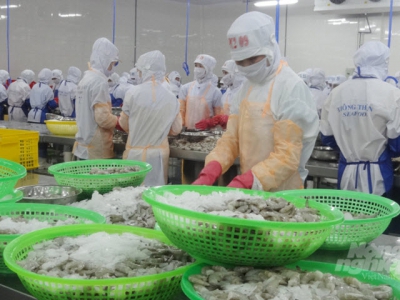Vietnams seafood industry is confident to face challenges

The flexibility of Vietnamese farmers in cultivation has been proven throughout the country's long tradition associated with agriculture.
The current supply is not completely broken, only partially. Full recovery and even growth are possible in the near future. Photo: Thanh Son.
Mr. Ho Quoc Luc, Chairman of the Board of Directors of Sao Ta Foods Joint Stock Company, said that access to resources is very limited due to the impact of Covid-19. Added with obstacles in transportation and instability in prices, shrimp farmers now feel hesitant to continue breeding new batch of seedlings.
“According to the current survey, seed suppliers offer very good incentives, up to 50% sale which proves that the consumption of shrimp seeds as well as shrimp feed is decreasing sharply,” said Mr. Ho Quoc Luc.
However, information from seafood processing and exporting enterprises shows that key export markets such as the USA, Europe and Japan are recovering very quickly after having Covid-19 under control. Demand for imported seafood, especially in the shrimp sector, has come back to an uptrend. The seafood industry can still turn the table and boost exports in the remaining months of 2021 if businesses seize the opportunities.
The flexibility of Vietnamese farmers in cultivation has been proven throughout the country's long tradition associated with agriculture. Shrimp farmers know what to do in the current context.
“Farmers can start an off-season crop. With current advanced farming techniques, they can completely find ways to cope with risks and take the active stance in anticipation of the upcoming increase in shrimp price," said Mr. Luc.
Mr. Luc believed that large enterprises in Vietnam have many years of experience. Their valor in markets can help them turn the tides and overcome difficulties.
The current supply is not completely broken, only in some parts. Full recovery and even growth are possible in the near future.
Large enterprises are stocking matured shrimps which will serve as processing materials for the fourth quarter of 2021. This source of shrimp has been accumulated by orders since the peak months, around May - July.
Sharing about matters concerning mobilization of workforce and assurance of production, Mr. Ho Quoc Luc analyzed, "We cannot let the supply chain completely disrupt. Shrimps still have to be raised, and processing still has to be active. Many workers cannot go to work at the moment, not to mention there are limited places to eat and stay at the factory. In the end, they still need income to ensure their livelihood, whether working or not.”
A large number of workers who previously had to work far away have returned to the locality. The current context may affect their mentality and make them lean towards looking for closer and safer jobs.
It is an opportunity for businesses in the Mekong Delta to attract more workers and feel reassured as business operations will soon return to normal thanks to good disease control measures.
“Reality shows that attracting a large number of workers will affect epidemic prevention and control. Businesses therefore need to accept this fact and carefully construct future plans. It will take more time to restore production and economy as companies can still only accept a limited number of workers," said Mr. Ho Quoc Luc.
Có thể bạn quan tâm
 Shrimp exports well on the way to recovery
Shrimp exports well on the way to recovery Vietnamese shrimp exports have taken a turn for the better as revenue reached around US$367 million in November, up 16 per cent compared to the same period last
 Tuna exports to Australia show a three-digit increase
Tuna exports to Australia show a three-digit increase Although Vietnam’s tuna exports to Australia remain modest in value, it is currently showing an impressive three-digit growth rate.
 Accerlerate efforts to restore fisheries production promptly
Accerlerate efforts to restore fisheries production promptly The Directorate of Fisheries proposed that businesses assist farmers in reestablishing output by supporting breeds.